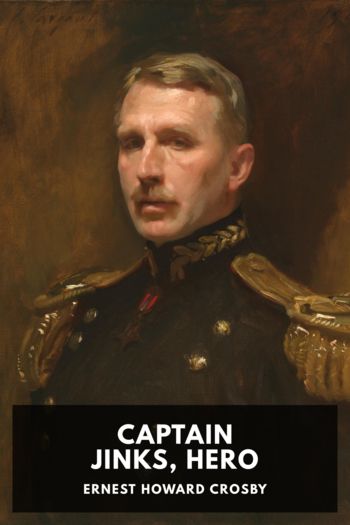What Doesn't Kill Us--A McKenzie Novel, David Housewright [best young adult book series .txt] 📗

- Author: David Housewright
Book online «What Doesn't Kill Us--A McKenzie Novel, David Housewright [best young adult book series .txt] 📗». Author David Housewright
“We received the call and sent an officer to check on the car and discovered that a BOLO had been issued for it by the Minneapolis Police Department. The car belonged to a businessman named Gerald King who had gone missing three weeks earlier. We alerted the MPD and they sent up a team to impound the car and tow it back to the Cities. All we did was secure the vehicle until they arrived.
“Later, we were asked by the MPD to accompany an investigator who canvassed the marina; interviewed the people who worked there or who had boats in the marina; some who actually lived on their boats during the summer. He flashed King’s photograph to everyone we could find, although there weren’t that many. Like I said, it was toward the end of the season and most of the regulars were gone. He flashed the photo and asked if anyone could remember speaking to King, seeing King. No one did. At least no one admitted it. And that was that. That’s all I could find in the supplementals. That’s all I could tell McKenzie.”
“You said that an investigator from the MPD did the canvassing,” Shipman said. “Who? Do you have a name?”
“Ah, it’s right here. A sergeant named Clayton Rask.”
Shipman was a little afraid of Lieutenant Rask. Truth be told, I was a little afraid of him myself. She sat across from LT in his office in Room 108, which was actually a suite of offices that served the Minneapolis Police Department’s assault, robbery, narcotics, forgery/fraud, sex crimes, and homicide units, among others, located in the Minneapolis City Hall–Hennepin County Courthouse. Rask had been running the Homicide Unit for as long as I could remember. He didn’t move up and he didn’t move sideways. Instead, he devoted his entire law enforcement career to catching killers. He was very good at it.
“McKenzie,” he said. “There have been times when I wanted to shoot him myself. Once, though, he did me a favor. I can’t tell you what the favor was. It’s—sensitive. That favor buys him a lot of slack with me, though. Don’t think he doesn’t know it, either.”
“I understand, LT.”
If you had a relationship with him, you didn’t call him Lieutenant or Rask and certainly not Clayton. You called him LT.
Rask glanced at his watch. He was always glancing at his watch.
“What can I do for you, Detective?” he asked.
“You spoke to McKenzie Tuesday.”
“I did.”
“Can you tell me what you spoke about—if it’s not sensitive?”
“It was about a missing persons case. Actually, I believe it was murder, although it was never designated as such.”
“Murder?”
“Gerald King was a businessman. Owned a finance company here in Minneapolis. One day, poof, he was gone. He was last seen leaving his office at five thirty P.M on a Wednesday in September in the year 2000. We did not get the call from his family. His wife had died four years earlier. His family, his immediate family, consisted at the time of a son named Porter, age twenty-one, and a son named Charles, age nineteen. They were both attending Northwestern University at the time. There was a daughter, age sixteen, named Jenna who was a sophomore at Minnehaha Academy. She and her father lived in the house alone. No, the call came from business associates who were alarmed that he hadn’t shown up at his office, blowing off several important meetings without explanation.”
“Odd,” Shipman said. “Usually, it’s the family who makes the call.”
“Within twenty-four to thirty-six hours of the subject going missing, too,” Rask said. “The children, however, claimed that it was not unusual for their father to stay away from home for days at a time. The middle child, Charles, accused the father of being an abusive, absentee father who slept around. He was very angry.”
“Was he?”
“Yes. The sister didn’t seem particularly happy, either. She confirmed what her brother had said.”
“What about the other son, Porter?”
“He didn’t say much of anything. Both Charles and Porter were in Chicago when Gerald disappeared. Well, Evanston. I didn’t discover that until later when I delved deeper into the case. At the time, I thought Gerald King had simply gone out for a pack of cigarettes and kept on going. A rich, middle-aged widower who became disenchanted with his life and simply walked away from it. It’s always been easy for Americans to go somewhere else and start over. That’s what our ancestors did. That’s why America exists today. You’re too young to remember the director of the Minneapolis City Council. She packed her bags, arranged for an attorney to pay off her debts, and, poof, she was gone. Nobody knew where she went. Everybody had a theory—she had embezzled money and was on the run or she had taken up with a secret lover or had been abducted or had been murdered. Turned out she had gone to San Francisco to become a different person. That’s what I was thinking about when I caught Gerald King’s case. There was no sign of foul play, as they say. No evidence of a crime.”
“What changed your mind?” Simpson asked.
“The car.”
“King’s car that was found in the parking lot of a marina on Lake Superior? Wouldn’t that have fit your initial theory? Park the car, jump on a boat, and sail to God knows where. Sail off to Canada.”
“Except we impounded the car and went over it. We found hair samples and a single drop of dried blood in the backseat that belonged to King.”
“So? It was King’s car.”
“What do you drive?” Rask asked.
“A Ford Prius.”
“Nice car.”
“Thanks.”
“Does it have a backseat?”
“Of course.”
“Ever sit there?”
Shipman found herself thinking about it.
“No,”





Comments (0)